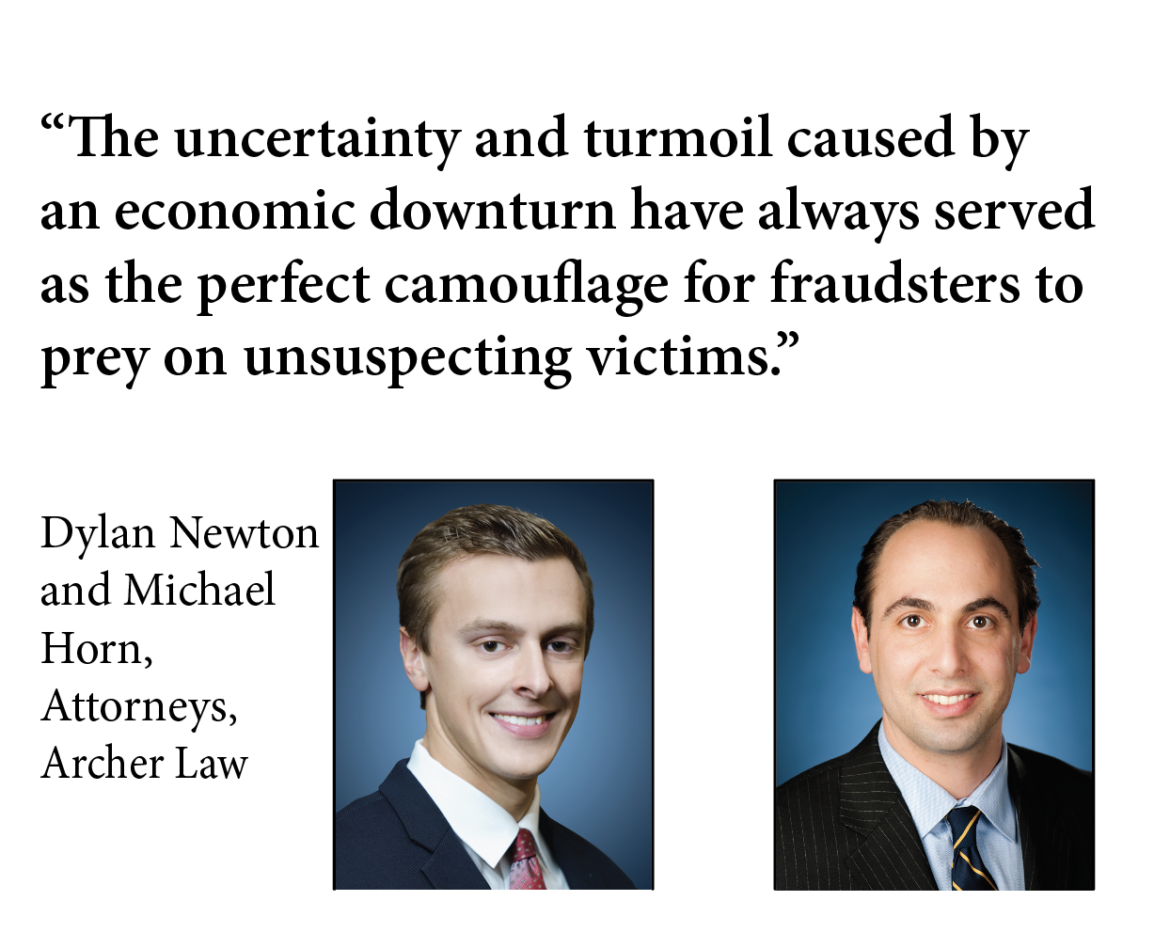By Dylan Newton and Michael Horn of Archer Law
Interest rates are increasing at their fastest pace in more than 40 years, and the country sits on the brink of a recession. Economic experts predict that the recent turmoil that began with record inflation coming out of the COVID-19 pandemic will create the perfect landscape for commercial real estate fraud and property disputes.
In fact, the number of lawsuits filed involving property disputes and fraud is expected to increase by nearly 20 percent in the coming months. And with rate hikes, inflation and slowed economic growth projected in 2023, commercial property owners and investors must brace for a flood of litigation. In addition, rising interest rates have also made obtaining financing more difficult than ever, adding an extra level of complexity in resolving disputes over deals that require heavy financing.
Below are a few common disputes that real estate stakeholders should be aware of as a result of recent economic sluggishness, as well as potential solutions to help protect investors.

Dylan Newton, Archer Law
Breach of Contracts
Soaring interest rates have caused countless would-be buyers to suddenly get “cold feet” and back out of deals. This phenomenon has been compounded by valuation swings in the market, causing many buyers to experience a sudden change of heart during the critical discovery and due diligence phases of transactions. While some would-be buyers have a sound legal basis for backing out of a deal, many do so in plain violation of their contractual obligations.
In the coming months, investors should expect an uptick in the number of lawsuits seeking the forced transfer of properties. Investors must take extra care to examine contracts before the closing date, paying particularly close attention to those provisions governing cancellation of the contract.
Many of these cases will involve emergency applications for injunctive relief, which is a very quick and effective tool. However, it is critical that investors act quickly, because these types of cases often move on an expedited basis.

Michael Horn, Archer Law
Real Estate Fraud
According to experts, real estate fraud has risen by more than 22 percent in the months immediately following the Federal Reserve’s progressive interest rate hikes. This comes as no surprise given that uncertainty and turmoil caused by an economic downturn have always served as the perfect camouflage for fraudsters to prey on unsuspecting victims.
Scams in commercial transactions often involve getting victims to enter into the sale or acquisition of a property by misrepresenting important financial information or the property’s condition before the deal is finalized.
One of the most frustrating aspects of real estate fraud is that illegal conduct is often hidden very well. Luckily, there are steps that investors can take to avoid being victimized.
For example, investors should take extra care to ensure that the due diligence provisions in their contract of sale provide sufficient protection. A qualified attorney should also conduct an in-depth review of the provisions before agreeing to any transaction.
In addition, buyers should be extremely reluctant to waive any inspections or examinations of the property, a practice that gained traction during the competitive market in the wake of COVID-19. If the seller continues to push for such a waiver during the negotiation process, that’s a red flag.
If an investor believes that he or she has been the victim of fraud, it is critical to act immediately before any relevant evidence is destroyed. The investor should first seek out knowledgeable counsel who can assist with issuing “litigation hold” notices to prevent the fraudster from destroying evidence.
Additionally, the buyer should make sure to preserve all documents pertaining to the fraud or communications with the fraudulent party. These documents will be vital for proving that a misrepresentation was made or that fraud occurred.
Shareholder Disputes, Partition Actions
Rising interest rates may also lead to an increased number of disputes between co-owners of commercial real estate. Historically, financial distress has provided the perfect landscape for a project partner to take advantage of an unsuspecting co-owner by squeezing him or her out of a lucrative investment.
For instance, the partner will often point to a sharp decline in profits as a pretext for arguing that fraud, negligence or a breach of fiduciary duties has occurred and that a forced sale of the property or court-appointed receivership is needed. As such, investors should be prepared for a surge of shareholder disputes and partition action in the coming months.
Unfortunately, the forced sale of a property or the appointment of a receiver by the court could be devastating to the profitability of an investment property. To avoid a catastrophic dispute, co-owners must take preemptive measures to protect themselves.
For starters, investors must make sure they have the correct entity documents, such as LLC or corporate bylaws, membership or operating agreements, from the onset of the relationship to clearly outline the rights and obligations of individual partners.
If there are no entity documents, it is important to work closely with an attorney to review the relevant statutes to understand the rights of each shareholder. Partnership disputes are complex, and it’s vital to protect yourself and your assets by collaborating with an attorney and experts who are experienced with commercial disputes.
In summation, commercial real estate players must anticipate a flood of lawsuits in the coming months. However, if they arm themselves with information regarding the types of disputes to expect, how to prepare and how to react to a lawsuit, they will be in a better position to weather the storm.
— Dylan Newton is an attorney in Archer’s business litigation group who represents clients in a variety of commercial litigation and business disputes. Dylan can be reached at dnewton@archerlaw.com. Michael Horn is a partner at Archer who specializes in general litigation with an emphasis on commercial litigation, UCC claims, contractual disputes, real estate litigation, products liability litigation, insurance coverage disputes and environmental litigation. He can be reached at mhorn@archerlaw.com. Both attorneys practice in Archer’s Hackensack and New York City offices.


